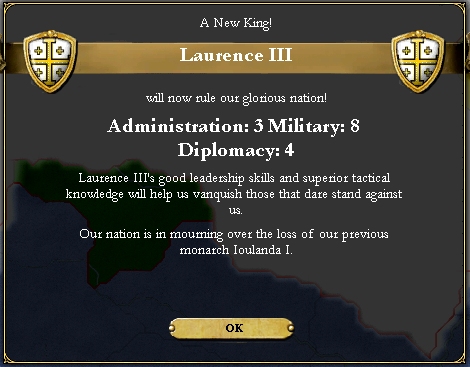Part 21: XXI. Baldwin XIV, Godfrey I, Queen Ioulanda I 1681-1733 A.D.
A few years after taking the throne, King Baldwin XIV led his forces against Vijayanagar, hoping to expand the holdings that his Grandfather, King Charles II, had conquered. Jerusalem's forces moved north and also invaded from the sea.
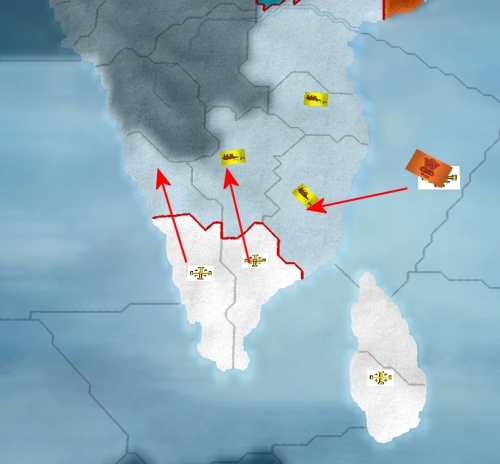
Vijayangar had become the junior partner in a personal union with the nation of Orissa, to their north-east, and King Baldwin quickly found himself fighting on a broader front then anticipated. After cutting through Vijayangar, the King led his forces towards the capital of Orissa, but was bloodily repulsed, much to his shock and humiliation.
The Indian Ocean fleet was dispatched back to Persia to pull troops from the border with Rum so as to reinforce the armies fighting in India. Fortunately Rum and their Byzantine allies were involved in one of their frequent wars with Venice, so the Persian frontier would likely remain safe.
The climate in India, however, did not agree with King Baldwin XIV. He took sick in the fall of 1688, and died on Christmas Eve.
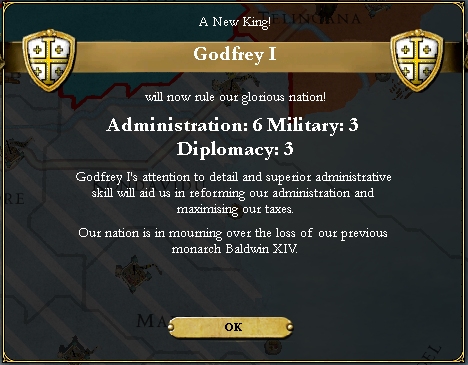
His younger brother, Godfrey, took the Crown and decided to command the war from Persia, not wanting to fall prey to the same disease that took his brother. Fortunately, the defeat in Orissa had been an aberration. Under King Godfrey's command, and reinforced with fresh Persian troops, Jerusalem's armies crushed the forces of Vijayangar and Orissa over the next two years.
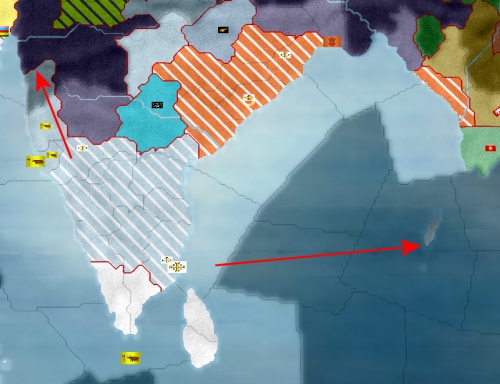
(Orissa is the occupied orange nation.)
In the summer of 1690, King Godfrey negotiated a peace treaty with the Indians. Due to the fact that Vijayanagar was functionally a vassal of Orissa, he couldn't force the two nations to sign separate treaties, which would have allowed for more gains. Instead he took the most land from Orissa, hoping to destroy the power of Vijayanagar's overlord.
Orissa was forced to cede most of their land and give the little nation of Arakan its independence. Arakan started in a military alliance with Jerusalem, although King Godfrey dissolved it before the tiny nation got any ideas that Jerusalem would support it in wars of conquest with its neighbors.
(You can't take more then 100% in a peace deal in land, so it makes more sense to get rid of Orissa, because, as they run the Personal Union, all negotiations have to go through them. Arakan is indicated with the green arrow. They promptly declared war on one of their neighbors, figuring we'd back them up. We declined.)
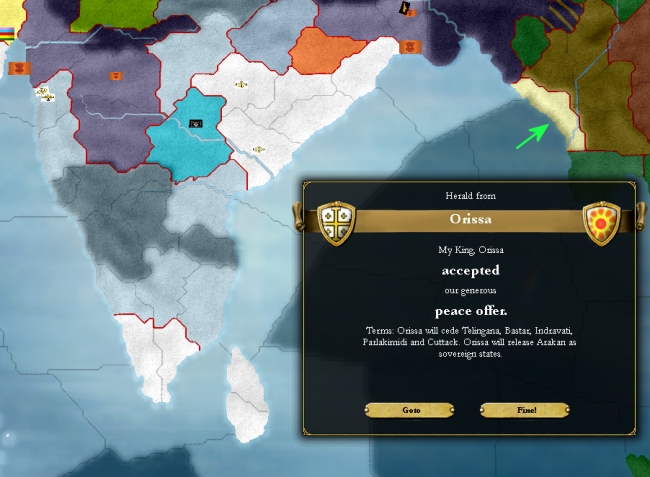
Two years later, in 1692, King Godfrey attacked Orissa again and annexed it in a brief war. He also forced Vijayanagar to release Mysore as an independent state, hopefully fatally weakening them.
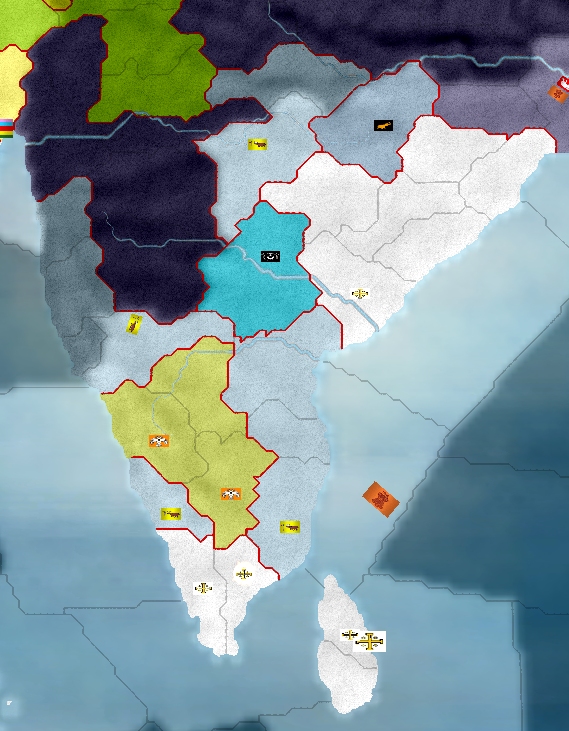
(Our badboy hits 17 with a limit of 18, so we'll have to lay low for a while. You take a big hit from annexing a nation.)
Good news came in 1696. After nearly two hundred years of heresy and rebellion the Protestant religion had been stamped out in Persia. The territories there had returned to the Catholic Church, much to the delight of King Godfrey, who also dispatched more missionaries to India.
The Kingdom of Venice was forced to sign a series of embarrassing peace treaties in 1698. The Russian Rum took their Polish territories, while the Byzantine Empire reclaimed a foothold on the toe of the Italian peninsula. Orleans had also jumped into the fray and reclaimed a portion of southern France.
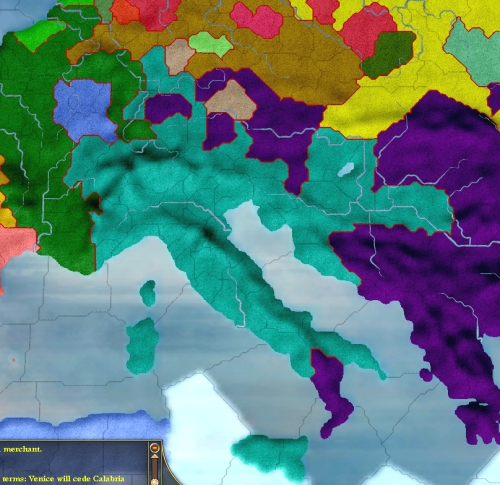

The World in 1700 A.D.
Click thumbnail for full-size
Despite the best efforts of the Church hierarchy, the liberal ideas and humanistic ideals of Western Europe were gradually making their way into the Kingdom of Jerusalem. Many in the nation were opposed to the old feudal system and the perceived injustices and power of the Church.
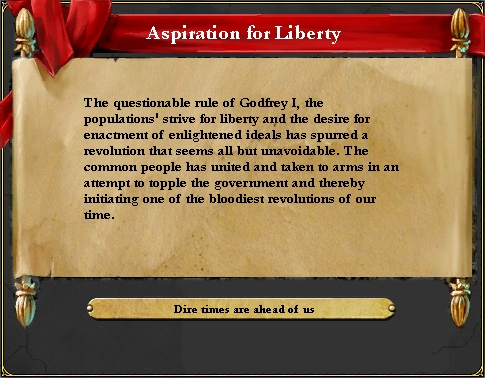
We lose three stability which increases our revolt risk substantially. Fortunately only a few provinces rise up and we quickly re-repress them.
Despite the fact that the Kingdom's armies kept the liberal revolts under control, King Godfrey couldn't take the stress and the challenge to his world view. He died of a heart attack in 1708, shortly after a popular book was published proclaiming that all men should have freedom of religion and be considered equal in the eyes of the state.
Without a son to succeed him, and with the Kingdom on the brink of chaos and revolt, many feared what would happen after his death. Fortunately for Jerusalem, his daughter, Ioulanda, was a brilliant and charismatic woman, who quickly seized power in the capital before the nobles could begin to bicker about who would become the next King.
She became the first reigning Queen of Jerusalem.
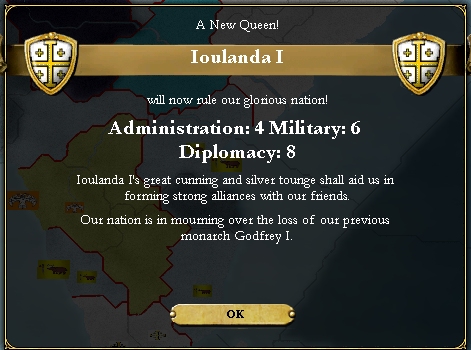
Trouble continued with riots and liberal unrest. The Index of Banned Books grew ever longer. Queen Ioulanda worked hard to restore stability to the Kingdom, but was often frustrated by the incompetence of her ministers and regional governments.
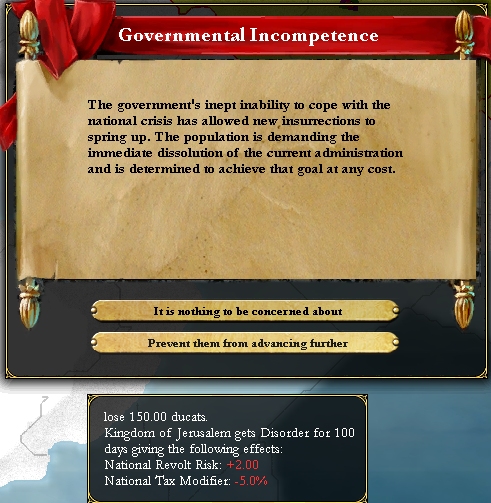
Finally, in 1712, after restoring stability to the Kingdom and granting certain liberal reforms, the crisis came to an end. Full fledged civil war had been averted. Queen Ioulanda was popular enough with the people that her concessions were seen as magnanimous rather then forced.
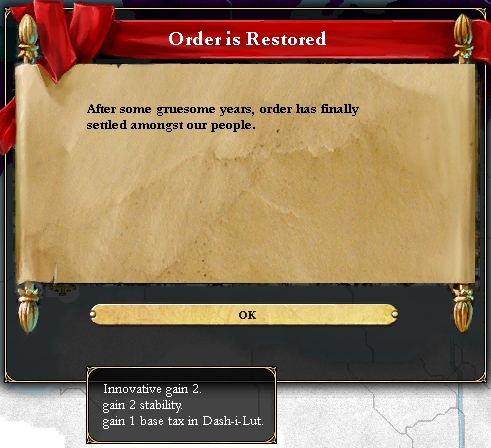
(We move two levels towards innovative. We didn't get a choice in this. Apparently the tide of modern thought can't be resisted altogether. This will make it a bit harder to raise stability in the future, but lower our tech costs. So it's not bad, really.
By this point, the Kingdom's problems with inflation had been solved, and Queen Ioulanda began an extensive program of improving the infrastructure of the Kingdom, building new forts, improvements, and manufactories at a breakneck pace.
In order to distract the Kingdom from any further desire for liberal reforms, Queen Ioulanda decided to start another war in India. She invaded Vijayanagar and Mysore, who'd allied in the meantime to resist just this eventuality.
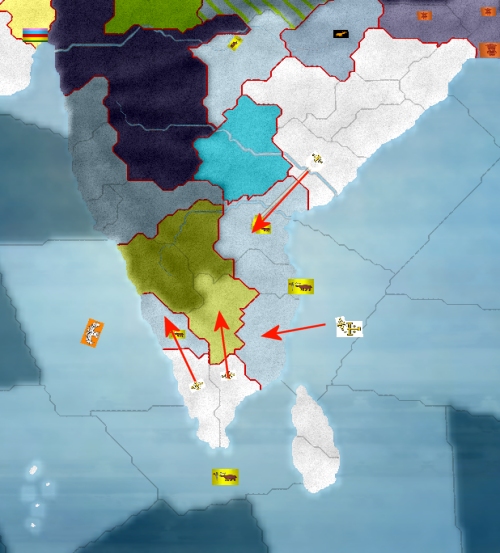
The war was going well when, quite suddenly, Jerusalem found herself embroiled in an entirely different conflict…
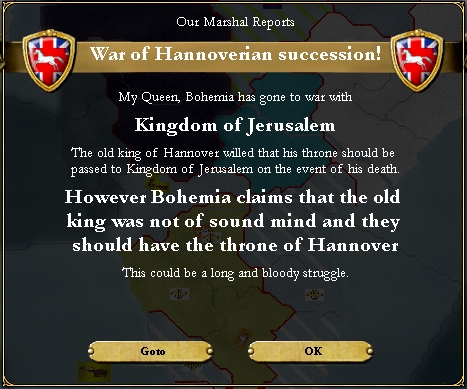
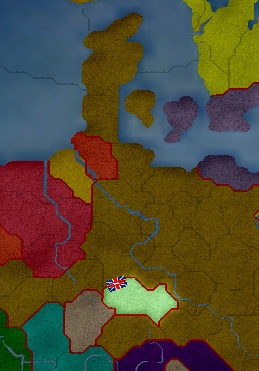
The King of Hannover, on his deathbed, willed his crown and tiny duchy to the Kingdom of Jerusalem. The Kingdom of Bohemia, however, contested the will, putting forth their own claim to the crown of Hannover.
Frankly, Queen Ioulanda couldn't have cared less about Hannover. Her attempts to make a white peace with Bohemia were rejected however, and within months Bohemian troops were landing on Cyprus.
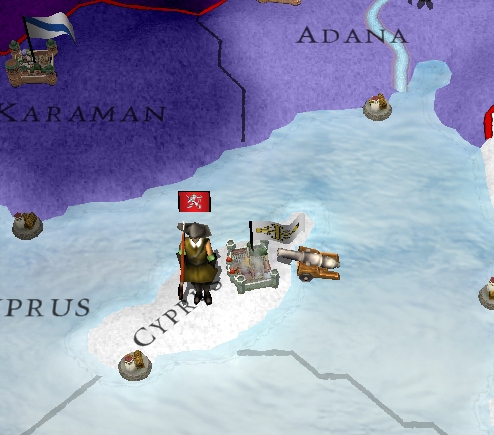
They were quickly driven off, but troops of Bavaria, Bohemia's ally, landed in North Africa, led by a brilliant military leader, General Johann Theodor Gumpenberg. Over the next few years he repeatedly crushed the much larger armies Queen Ioulanda sent against him, and moved ever closer to Alexandria and the riches of Egypt.
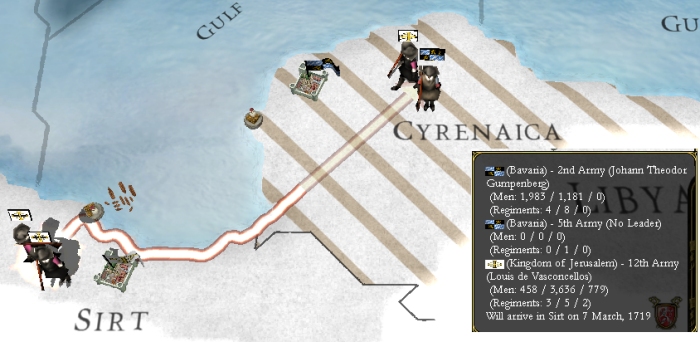
The war in India, meanwhile, was going much better and, in 1718, Jerusalem forced substantial concessions from both Vijayanagar and Mysore.
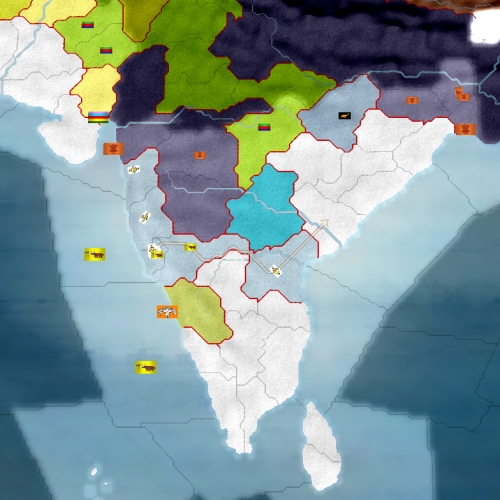
In late 1719 a massive force of thirty thousand soldiers of Jerusalem, including ten thousand hastily raised mercenaries finally surrounded and defeated General Gumpenberg at El Alamain, just west of Alexandria.
The official story was that the Bavarian General was run down on the battlefield and killed. But rumors persisted that Queen Ioulanda, although professing hatred for the man, had him secretly brought to her encampment, where they became lovers. Some say he remained in Jerusalem, in disguise and secrecy, for the rest of his life. Others that he was given a large estate in Crusader India.
What is known for sure is that, shortly after the Kingdom's victory and the peace treaty signed with Bohemia, Queen Ioulanda made a young and otherwise unremarkable Arabian nobleman her Prince Consort. Furthermore, their son, Prince Laurence, was born slightly 'prematurely'. Despite its later popularity in songs and stories, most respectable historians consider the Ioulanda-Gumpenberg connection to be completely imaginary, and cite a total lack of historical evidence in its favor for dismissing it. Supporters (romantics they may be) point to the later military brilliance of King Laurence III and the similarity in appearance between paintings of the young man and his supposed father.
The truth will likely never be known.
Over the decades after the humiliating loss of part of southern Italy to the Byzantines, Italian nationalism surged, and reached a fervor pitch in 1722. The King of Venice moved his capital to Rome and declared himself King of all Italy and Italians. The stage was being set for another conflict with Byzantium…
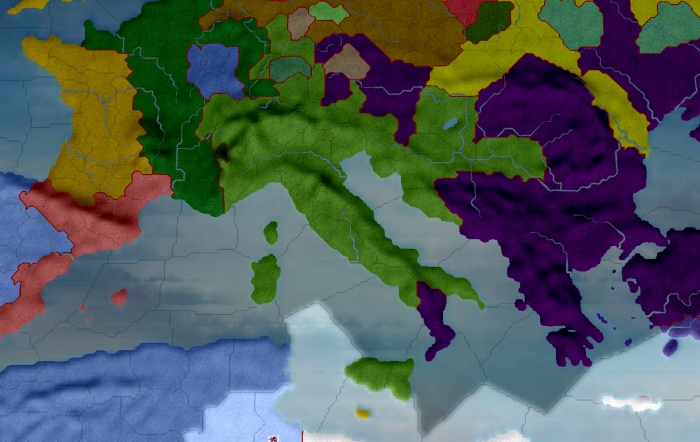

1725 was a year of many changes and advances. Queen Ioulanda commissioned shipyards in Alexandria and Basra to strengthen the navy and also began to fund the fine arts. New revolutions in military technology were also taking place, and the armies of the Kingdom continued to modernize.
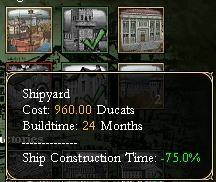
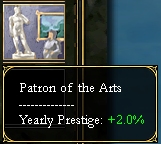
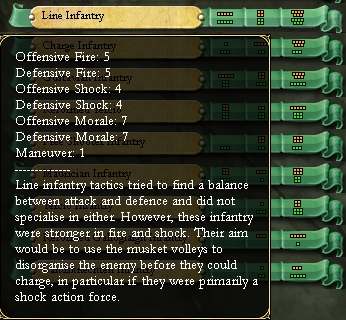
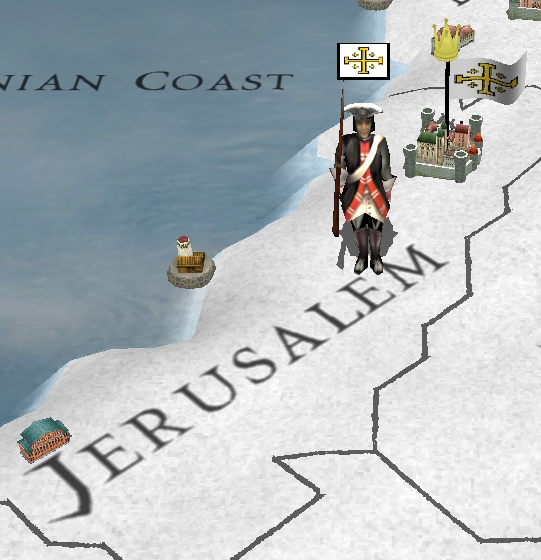
In 1729, Queen Ioulanda launched another war in India, hoping to finish off Mysore and take more of Vijayanagar's territory. The new 'line infantry' of the Kingdom made a good show, and easily crushed the local Indian troops who, by now, were using crude muskets of their own.
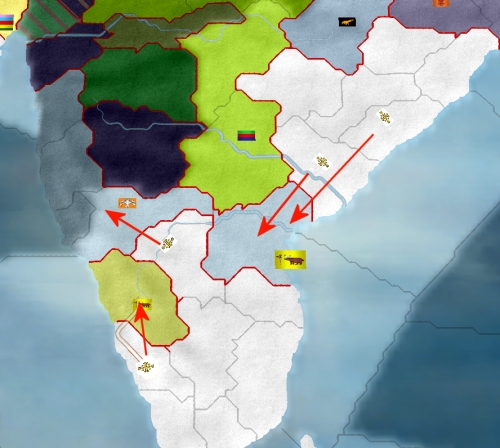
There was, however, widespread resistance to the Kingdom's policies of conscription. Another legacy of the liberal revolts, no doubt. Fortunately, the armies in India seemed strong enough to finish the war and the Queen decided to slow conscription slightly so as to avoid revolts or loss of stability.
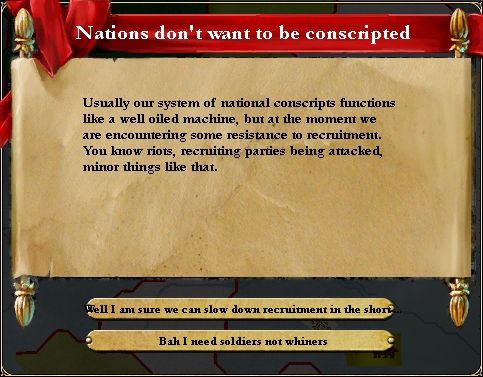
Mysore was annexed the next year and most of Vijayanagar's land was stripped away. All that remained of the nation that had once dominated southern India was a single port and a single island in the Bay of Bengal. Jerusalem's star was rising in India and Catholicism was slowly taking route amongst the natives.
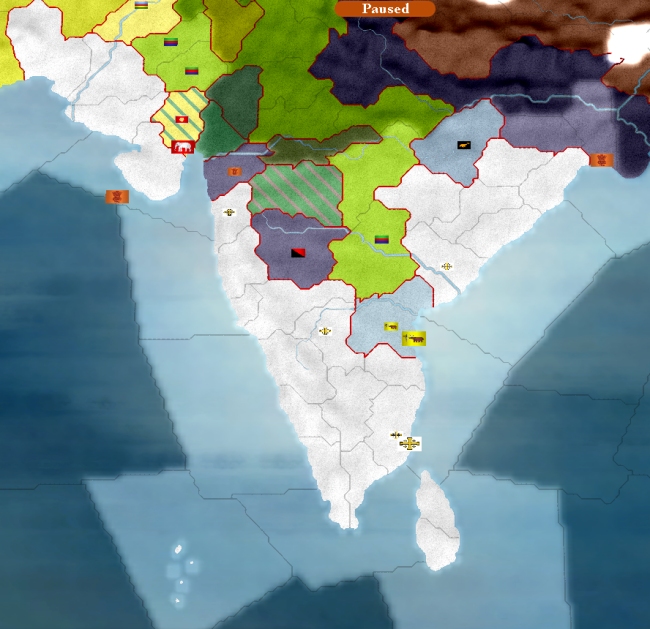
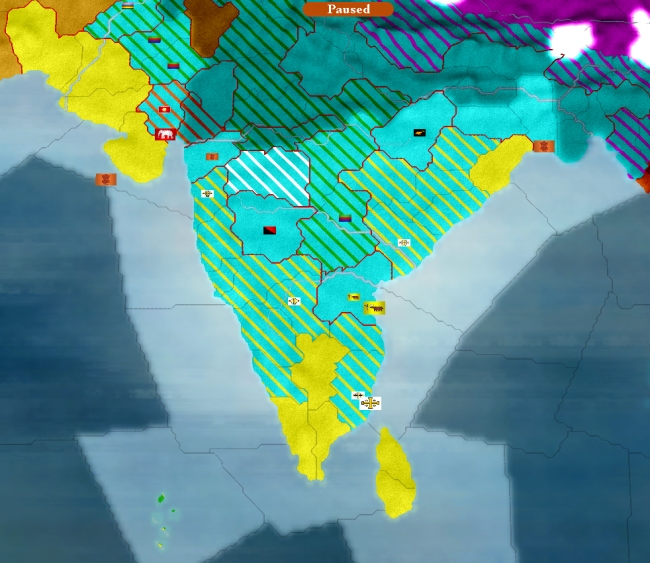
In the fall of 1731, news came that the Scottish Union had been forced to sign a humiliating peace treaty with the Russian Rum, releasing Wales as an independent nation. The Welsh had long struggled against Scottish rule and the weak King of the Union had reluctantly granted their independence rather then continue to fight against the strength of Rum.
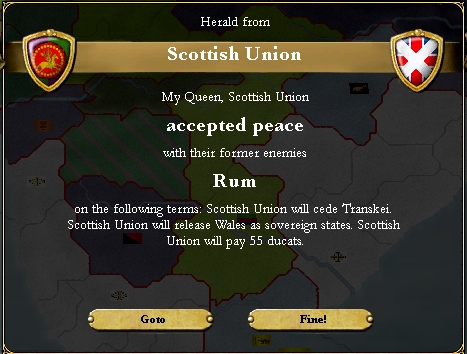
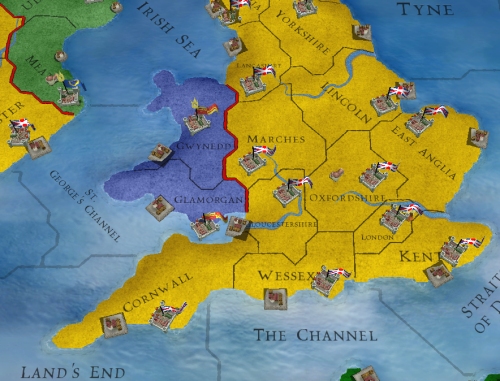
In 1732, Ming China annexed the Indian nation of Gondwana, and now shared a land border with the Kingdom of Jerusalem. Queen Ioulanda made sure to reinforce her troops their. So far the Kingdom had not had any real relations with the vast Chinese nation, but that time had apparently come to an end…
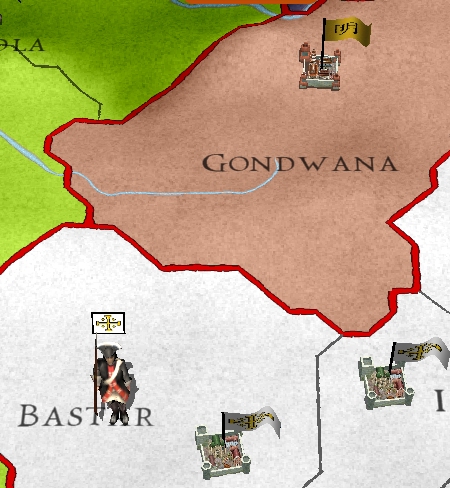
After twenty-five years on the throne, Queen Ioulanda died in 1733, leaving the Kingdom to her bold young son Laurence III.
